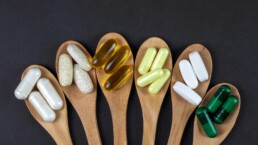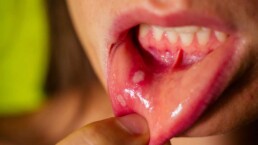Dealing with bloating can be frustrating and embarrassing. Luckily, there are home remedies and natural methods to help. This guide will show you how to ease gas, reduce bloating, and boost your digestive health.
Table of Contents
ToggleKey Takeaways
- Understand the causes of bloating, including gas, bacterial fermentation, and carbohydrate intolerance.
- Identify dietary and lifestyle factors that contribute to bloating and learn how to avoid them.
- Discover quick-acting home remedies and natural methods to provide immediate relief for bloating.
- Explore long-term strategies, such as gradually increasing fiber intake and staying hydrated, to prevent future episodes of bloating.
- Learn about effective herbal teas, spices, and over-the-counter remedies that can help alleviate gas and bloating.
Understanding Bloating and Its Causes
Bloating is a common issue many people face. It happens when gas builds up in the stomach. This gas can come out as burps, bloating, or passing gas.
The gas in our stomach has different parts like oxygen, nitrogen, carbon dioxide, hydrogen, and methane.
The Passing of Gas and Intestinal Gas Composition
Gas leaves the body through burping, bloating, or passing gas. Knowing what’s in intestinal gas helps us understand bloating better. It’s made of oxygen, nitrogen, carbon dioxide, hydrogen, and methane.
Bacterial Fermentation and Carbohydrate Intolerance
Gas and bloating often come from bacteria breaking down carbs like lactose and raffinose. If you can’t digest carbs well or have gut bacteria issues, you might feel bloated more.
Learning about bloating helps us find ways to fix it. This way, we can ease the discomfort many people feel.
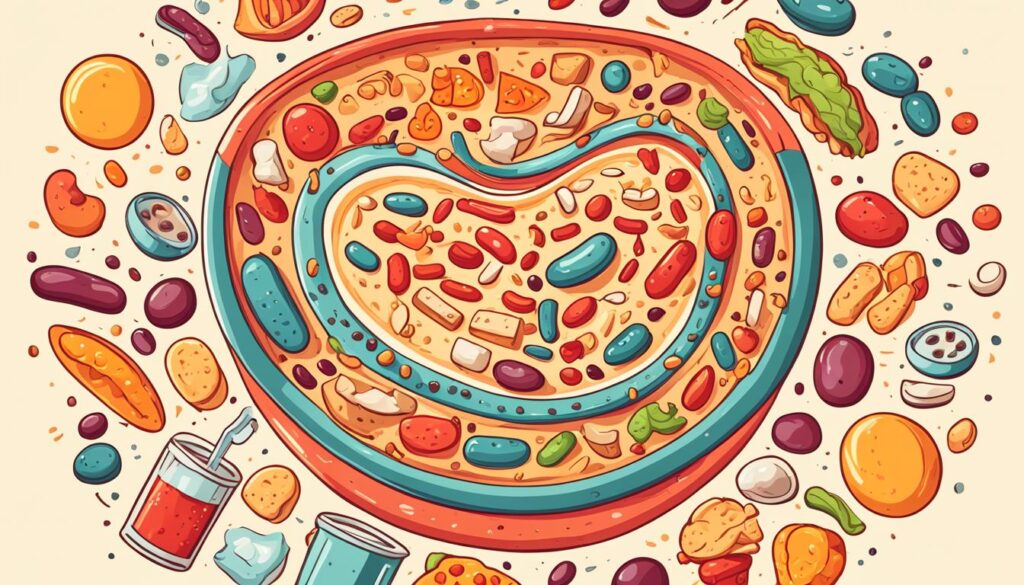
Dietary and Lifestyle Factors Contributing to Bloating
Some eating habits and food choices can cause bloating and gas. Knowing what foods and behaviors lead to these issues can help you avoid them. This can make you feel better.
Behaviors and Food Choices That Can Lead to Gas
Swallowing air, eating fast, chewing gum, and drinking fizzy drinks can add air to your stomach. This can cause gas and bloating. Also, foods like broccoli, beans, onions, fatty, spicy, or fried foods can make gas and bloating worse for some people.
Keeping a food diary can show you what foods make you gassy. By noting what you eat and how you feel, you can avoid foods that upset your stomach.
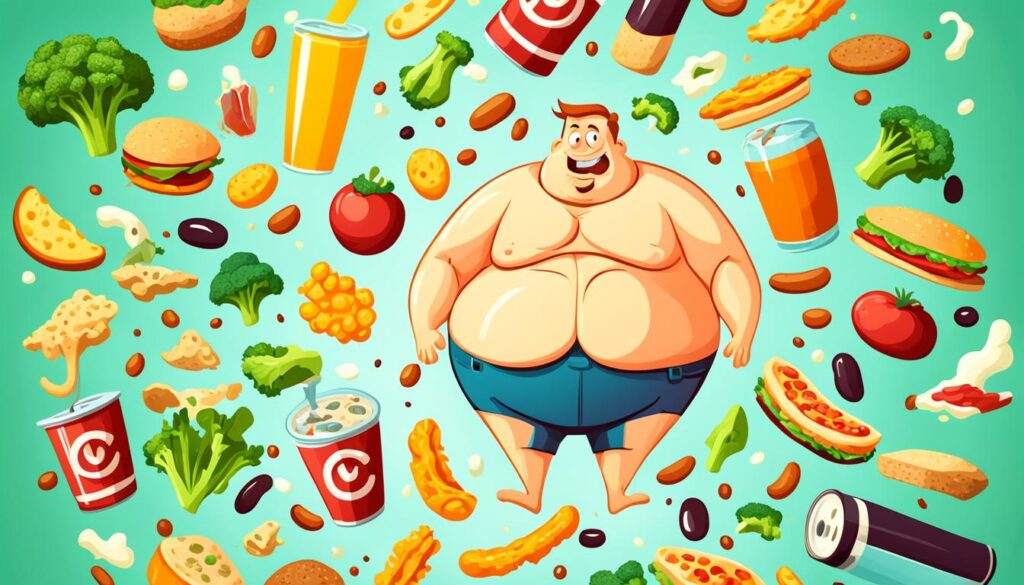
Stress and not moving enough can also make digestion tough. Trying stress-reducing activities like meditation or deep breathing can help. Regular exercise is also good for your digestion.
Knowing what foods and habits cause bloating lets you avoid them. This can make you feel better and improve your health.
Quick Relief for Bloating
Feeling bloated can be really uncomfortable and ruin your day. Luckily, there are quick home remedies that can help. These simple techniques can give you the fast relief you need, whether you’re looking for immediate help or ways to reduce bloating.
One easy way to ease bloating is by taking a gentle stroll. A short walk can help kickstart digestion and release trapped gas. Yoga poses like Child’s Pose or Legs-Up-the-Wall can also help. They gently massage the belly and aid in gas flow.
If you need quick relief, consider peppermint capsules or over-the-counter gas relief meds. Peppermint’s menthol relaxes the intestines and lessens bloating. Gas relief pills can also break down the gas that’s causing discomfort.
Abdominal massage is another great way to find fast relief. Massaging your belly in a clockwise motion can release trapped gas and ease bloating. Taking a warm bath or using essential oils like fennel or curcumin can also help. These oils have anti-inflammatory properties that soothe a bloated belly.
While these quick remedies offer fast relief, it’s key to tackle the root causes to avoid future issues. Eating well, drinking plenty of water, and reducing stress can help manage and prevent bloating over time.

Long-Term Strategies to Prevent Bloating
Quick fixes can help for a little while, but lasting changes are key for avoiding chronic bloating. Slowly changing your diet, how much water you drink, and your exercise can help your digestion. This can reduce gas and bloating over time.
Increase Fiber Gradually
Increasing fiber is a great way to stop bloating, but do it slowly. Adding too much fiber too fast can make bloating and discomfort worse. Start by adding small amounts of high-fiber foods like fruits, veggies, whole grains, and beans to your meals. Gradually add more fiber over time to let your body adjust.
Hydrate and Exercise Regularly
Drinking enough water and exercising often can also stop chronic bloating. Drinking enough water helps make stool softer and helps you go to the bathroom regularly. Exercise can help move your gut and reduce gas. Try to drink lots of water each day and do a mix of cardio and stretching exercises weekly.
By making these lasting changes, you can prevent chronic bloating, find long-term bloating solutions, and boost your digestive health.
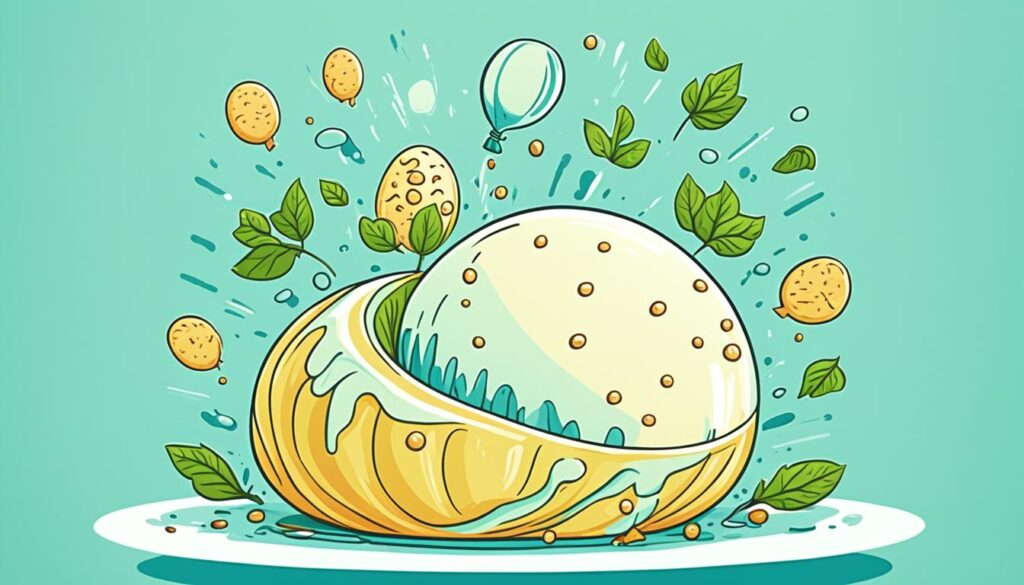
Natural Remedies for Gas and Bloating
If you’re dealing with gas and bloating, there are natural remedies you can try. These options can help you feel better without the side effects of over-the-counter drugs.
Herbal Teas and Spices
Herbal teas like peppermint, chamomile, and ginger can soothe your digestive system. They might ease gas and bloating by reducing inflammation and helping with digestive enzymes. Spices like anise, caraway, coriander, fennel, and turmeric are also thought to help with gas.
It’s key to talk to your healthcare provider before trying these natural remedies. Some might not mix well with your medications or could have side effects. Always get advice before adding new remedies to your routine.
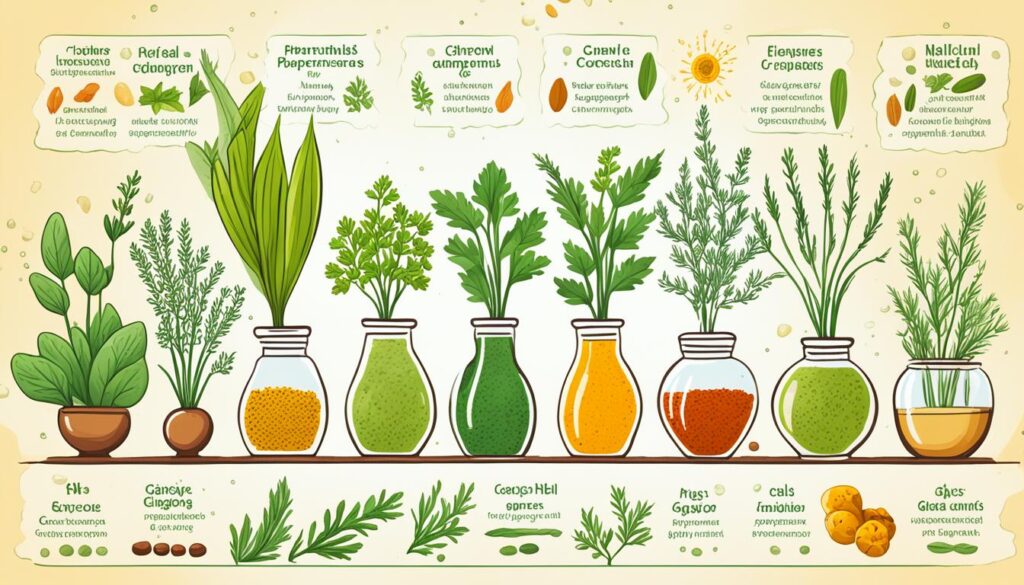
Looking into these natural remedies can help you find gentle ways to ease your discomfort. It can also improve your overall digestive health.
Over-the-Counter Remedies for Bloating
If you’re looking for quick relief from gas and bloating, over-the-counter (OTC) treatments are a good choice. These options target the main causes of your discomfort. They offer a way to find quick relief.
Simethicone is a common OTC choice found in Gas-X and Phazyme. It breaks up gas bubbles, making them easier to pass. This can ease bloating and the discomfort from too much gas.
Beano contains the enzyme alpha-galactosidase. This enzyme helps break down carbohydrates that can cause gas. It may help reduce bloating from foods like beans, broccoli, and whole grains.
Pepto-Bismol and activated charcoal can also help with gas and bloating. Pepto-Bismol soothes the digestive tract. Activated charcoal binds to gas-producing compounds, helping them leave the body.
When using OTC gas and bloating treatments, always follow the instructions. Talk to your healthcare provider, especially if you have other health issues or plan to use them for a long time. These remedies can offer quick relief but might not fix the underlying cause of bloating.
When to Seek Medical Attention
Occasional gas and mild bloating can often be handled at home. But if you have persistent, severe, or getting worse bloating with other symptoms like weight loss, diarrhea, vomiting, or stomach pain, see a doctor. These signs might mean you have a health issue that needs a doctor’s care.
Health problems like inflammatory bowel disease, irritable bowel syndrome, and gynecological issues can cause ongoing bloating. If home remedies don’t work or your symptoms get worse, talk to your healthcare provider. They can figure out what’s causing your bloating and give you the right medical care.
Mild bloating is common, but watch your body and get medical help if you have severe bloating symptoms or if it doesn’t go away. Your doctor can spot any underlying medical conditions and suggest the best treatment to help you feel better.
Dietary Modifications to Reduce Bloating
If you’re dealing with ongoing bloating, making smart diet changes can help a lot. Start by keeping a detailed food diary to find out what foods cause your bloating. This way, you can see which foods make you feel bad.
Some people find relief by trying a low-FODMAP diet. FODMAP stands for Fermentable Oligosaccharides, Disaccharides, Monosaccharides, and Polyols. These are carbs that some folks can’t digest well. Cutting out foods like dairy, wheat, beans, and some fruits and veggies can ease bloating and other stomach issues.
Keep a Food Diary
- Track the foods you eat and any bloating or gas you feel
- Keep an eye on when and how bad your symptoms get
- Look for patterns to figure out what foods trigger your bloating
Consider the Low-FODMAP Diet
- Try cutting out high-FODMAP foods for a bit
- Slowly add foods back in to see how you react
- Get help from a healthcare pro or dietitian to make sure you’re getting all the nutrients you need
By changing your diet, you can help reduce bloating and boost your digestive health. Remember, what helps one person might not help another. So, be patient and keep trying until you find what works best for you.
Medications and Supplements to Avoid
Dealing with ongoing bloating means being careful with some medications and supplements. These can make gas and discomfort worse. It’s important to know which ones to avoid.
Iron supplements are often needed but can cause constipation and make bloating worse. Some medicines like antacids, antibiotics, and pain relievers can also upset your stomach. This can lead to more gas and bloating.
Talk to your healthcare provider if you’re dealing with constant bloating. They can check your meds and supplements. They might suggest changes or other options to help you feel better.
Supplements that Contribute to Gas
- Iron supplements
- Fiber supplements (when introduced too quickly)
- Protein powders and shakes
- Probiotic supplements (in some cases)
Medications that Cause Bloating
- Antacids
- Antibiotics
- Pain relievers
- Certain blood pressure medications
Being aware of these items and working with your healthcare provider can help. You can reduce bloating and gas. This makes your digestive system more comfortable and enjoyable.
Conclusion
Bloating is a common issue that can be tackled with home remedies, lifestyle changes, and sometimes medical help. By figuring out what causes bloating, using quick fixes, and taking steps to prevent it, you can ease discomfort. This helps improve your digestive health.
Being proactive is key. Find out what makes you bloated and work with health experts to make a plan just for you. This might mean changing your diet, adding exercise, or trying natural remedies to handle gas and bloating.
Using a whole approach and trying home remedies for bloating and natural solutions for gas and bloating can help you take back control of your digestive health. With the right mix of strategies, you can beat this common problem. This way, you can keep your digestive system balanced and healthy.
FAQ
What are the main causes of bloating?
Bloating happens when gas builds up in the gut. This is often from bacteria breaking down carbs like lactose and raffinose. People who can’t digest carbs well or have gut bacteria imbalances tend to get bloated more.
What eating behaviors and food choices can contribute to bloating?
Swallowing air, eating fast, chewing gum, and drinking fizzy drinks can add extra air to your system. Foods like broccoli, beans, and onions can also cause gas and bloating in some folks.
What are some quick home remedies for relieving bloating?
Taking a walk, doing yoga, or using peppermint capsules can help ease gas. Warm baths and essential oils like fennel and curcumin can also help soothe a bloated belly quickly.
What long-term strategies can help prevent chronic bloating?
Eating more fiber slowly, staying hydrated, and exercising can help your digestion and reduce gas. It’s key to add fiber slowly and drink plenty of water and stay active for healthy digestion.
What natural remedies can help alleviate gas and bloating?
Teas like peppermint, chamomile, and ginger can calm your digestive system. Spices like anise, caraway, coriander, fennel, and turmeric are thought to help reduce gas and ease discomfort.
What over-the-counter medications and supplements can help manage bloating and gas?
Products like Gas-X break up gas bubbles. Beano has an enzyme to help digest gas-making carbs. Pepto-Bismol and activated charcoal can also offer quick relief.
When should you seek medical attention for persistent bloating?
If bloating is severe, lasts a long time, or gets worse, and you have other symptoms like weight loss or pain, see a doctor. Conditions like inflammatory bowel disease or gynecological issues can cause ongoing bloating.
How can dietary modifications help prevent and manage chronic bloating?
Keeping a food diary to find out what foods cause bloating is a good start. For some, a low-FODMAP diet can help reduce bloating and digestive issues.
What medications and supplements can exacerbate bloating and gas?
Iron supplements can lead to constipation and make bloating worse. If you have ongoing bloating, talk to your doctor about your meds and supplements.
Source Links

This article is medically reviewed by Dr. Chandril Chugh, Board-Certified Neurologist, providing expert insights and reliable health information.
Dr. Chandril Chugh is a U.S.-trained neurologist with over a decade of experience. Known for his compassionate care, he specializes in treating neurological conditions such as migraines, epilepsy, and Parkinson’s disease. Dr. Chugh is highly regarded for his patient-centered approach and dedication to providing personalized care.



